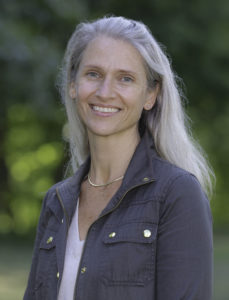Only Connect
Message from the headmaster
It sounds like a routine observation: the biggest challenge we’re encountering in the first days of school at St. Johnsbury Academy is that we are too far apart.
We find ways to come together without getting too close. We strain sometimes to hear each other through our masks and face coverings (which, for the record, absolutely no one enjoys wearing — but we must!). And not that anyone can really tell from a distance, but we have very clean hands.
We prepared well for the experiment of opening school, and the overwhelming feeling here is of delight that we can all be together. I am loving saying good morning at the door of Colby Hall every day, and students and teachers alike impress me regularly with their optimism. We are also living inside this experiment, showing beyond doubt that the only way to learn a set of skills is to try using them, then learn some more, then try again. We assess how things are going, and adjust what we’re doing based on new information — not just our immediate experience but new data about the pandemic.
Our teachers are learning that it is no easy undertaking to teach two separate groups of students at once, one in the room and one on Zoom, with a mask-muffled voice, while at the same time trying to enable those two groups to see, hear, and talk to each other reasonably. Difficulty seeing and hearing each other can be howlingly frustrating; everyone involved is eager to make this work, but it is undeniably tough.
That said, I have little doubt that we will get it; and along the way we won’t just overcome the obstacles we find, but we’ll examine them deliberately to better understand what’s important. Which brings me back to a version of my earlier observation: feeling connected lets us get our bearings and understand our lives, and right now we are forced to be separate.
In his book Connected, social scientist Nicholas Christakis argues convincingly that being in lots of different relationships with other human beings is such a basic part of our humanity that without those relationships we wither, and ironically, become less able to connect with people.
That doesn’t only include family or other close relationships — it also includes those that are exasperating, or complicated, or challenging, or that occur just because you go to the same school and listen to the same story being read while sitting together. These are all connections that create the weave of our lives. When we connect, it can be joyful — we can help each other along, surprise and amaze each other, laugh together, which is so much better than laughing alone, and my favorite, we can talk about things that matter to us and share our stories. Sometimes we connect only to disagree — but that’s also something that you can’t do alone.
So it’s hard to have our connections so wobbly as we stay distanced. Even the ways we describe the glitches on Zoom reflect this stress — we’re breaking up, we’re freezing, we’re blurring, we’re falling off, we’re being kicked out — we’re trying to connect, and failing may be more troubling than we realize.
I think we can reasonably compare our difficulty seeing, hearing, and being close to one another because of the pandemic to the difficulty we often have seeing, hearing, and aligning with each other about our shared humanity. Making these connections, even when they’re not easy or comfortable, is part of becoming a strong person and a good community member, and helping students do it well is part of the essential mission of St. Johnsbury Academy. The relationships students develop with teachers and mentors, and perhaps even more so with their peers, don’t just make life better — they determine what students learn and how they learn it, how wide and inclusive their view of the world is, how readily they make intellectual connections and understand biases, how they know to connect history with the present, and how they express themselves in ways that help others understand who they are and what they think.
They also determine how we function as a community. With the nation deeply divided, often hardly able to speak with civility, for these young people, we need to insist on making connections in every way we can, even when they are uncomfortable. We need to insist that we make space for and really listen to other people’s stories so we can understand who they are, what they think, and what they can teach us. When we do, we create connections strong enough to keep us from freezing or breaking up, that show us the best versions of ourselves.
So: we will keep working toward seeing and hearing each other more clearly, not just literally on Zoom (though that will be nice), but as a community that reaches everyone.

Dr. Sharon L. Howell
Headmaster

